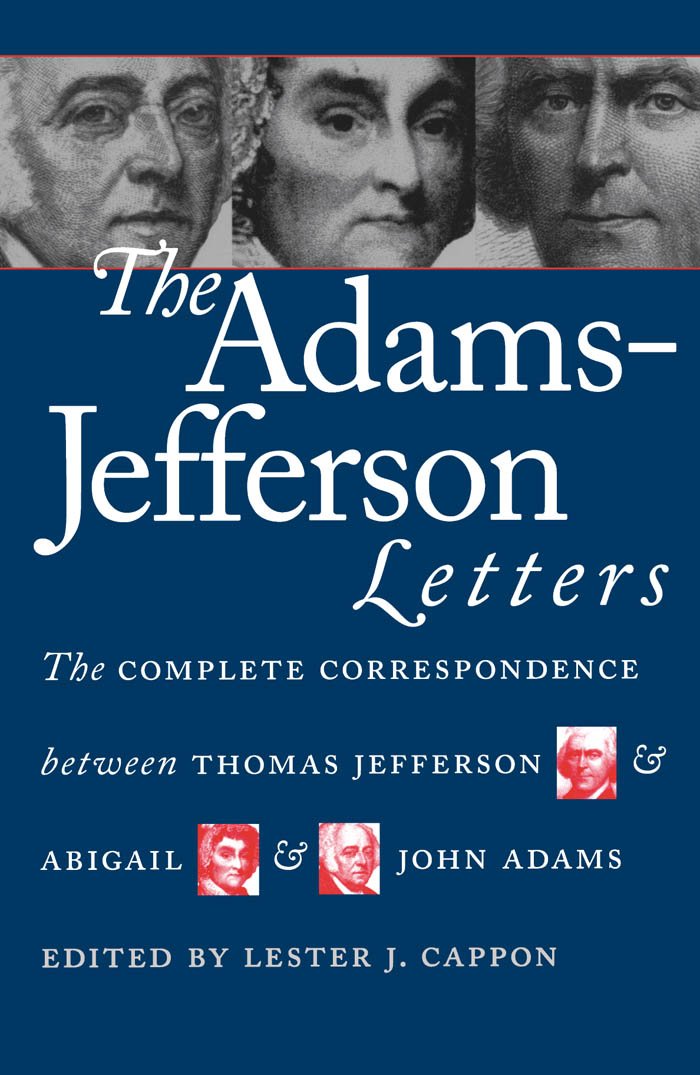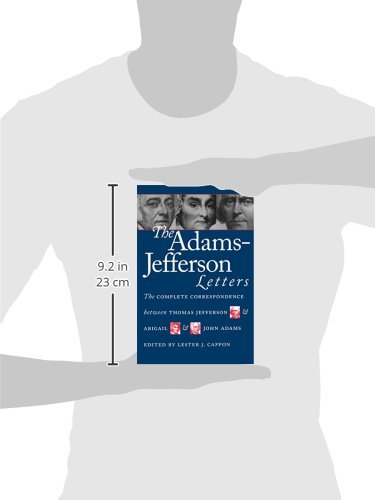


The Adams-Jefferson Letters: The Complete Correspondence Between Thomas Jefferson and Abigail and John Adams
G**6
A Must Have Resource for American Revolution and Early Republic Scholars
This wonderful accessory to any study of John Adams and or Thomas Jefferson is a must have volume for scholars. It is extremely rare to have an opportunity to study the correspondence between two figures who were close friends, then political opponents, and finally friends again through a renewed correspondence. For this we can heartily thank Dr. Benjamin Rush who can count this achievement among his many such during his lifetime. The only thing better than this collection would be a volume that included all of the letters present in this book as well as many others between Adams, Jefferson, and their contemporaries such as Rush. That may very well be a project worthy of an electronic database. The letters these two men exchanged may have been among the most personal ones they wrote short of the ones to their loved ones. Both men were among the leading intellectuals of America in their times. They covered many topics which are of interest to scholars as they have a chance to cover a wide range written both before and after their period of estrangement. For a long eleven year span from 1801 to 1812 the two exchanged no correspondence. A brief exchange between Abigail Adams, John's wife, and Jefferson in 1804 ended as Abigail felt miffed at Jefferson's replies to her letters. John added a short note that he had been unaware of the exchange until the last minute when Abigail showed him the last letter she was writing to Jefferson. The pens fell silent between them once again. However, Dr. Rush felt that the two men needed to renew their old friendship and he worked diligently to restore it. Both men noted Rush in their letters on this endeavor. The correspondence between these two men who are endlessly linked to one another in American history in the last 14 years of their lives is remarkable. It is also probably unparalleled in that every letter was preserved and collected into the one volume edited by Lester J. Cappon. This volume also contains the correspondence between both men and Abigail Adams which serves to expand the overall exchange. Cappon's commentary breaks the letters into manageable chapters. They are printed in the exact order they were written in which gives an outstanding continuity to the project. Originally published in two volumes, this complete and unabridged edition contains every letter by the three plus Cappon's commentary, his footnotes, and bibliography. The footnotes add to the depth of the volume and provide points of reference for various events the men described. However, Cappon did not critique the letters in his commentary except to provide clarity and context for the upcoming sequence. He let them do their own talking. Despite the fact that this book was first published in 1959, it is still just as worthwhile to own today as it was then. Not only that, the letters of these men and Abigail have more historical value today than they did when they were written. Then they were explaining themselves and their views to each other, but both understood that their correspondence would belong to posterity. This was discussed, but there was nothing the two could do about it as long as it was not done during their lifetimes which it was not. Their descendants made a few attempts at publishing some of the letters, but not until Cappon compiled this work were they all collected in one collection. The result is an amazing view into the minds of our second and third presidents who had a major impact upon that shaping of America. The fact that both were political opponents for several years only adds to the luster of these letters. The one drawback is that while they did discuss many issues from 1812 until their deaths, they didn't go into much depth regarding their politics or the politics of the country during these years. Adams pried, but Jefferson resisted the temptation for the most part. On other subjects such as religion, education, and economics they wrote extensively. In fact, their views on religion can be found in these letters and may be the best statements on the subject either of them made in their lives. While they had some amount of disagreement on the subject, they both agreed that organized religion was a bane for America as a whole. Jefferson, who put together the University of Virginia, asked Adams for advice on more than one occasion which Adams of course was willing to provide. Adams wrote twice as many letters to Jefferson after 1812 than Jefferson wrote to him, but in their earlier correspondence Jefferson wrote more than Adams did. It should be noted that Jefferson complained about having to write so many letters to so many people, but when he did answer Adams he wrote many long letters. Adams himself was not concerned and replied that each of Jefferson's was worth four of his. Again, the letters themselves are definitely worth reading for their content and to catch a glimpse of how these two men viewed the world around them. That in itself makes this collection a timeless entry in American history.
M**N
An Indispensable Primary Record
There are only a few people who have the desire and the patience to read 600 pages of 200-year-old letters. If you are one of these people, do yourself a favor and read this book now. If you are not one of these people, try really really hard to become one of these people and read this book now. And if you can't possibly imagine ever being the kind of person who reads this kind of book, then do the rest of us a favor and don't go all over the Internet popping off about what "The Founding Fathers" believed about stuff based on something that you heard on the radio. Because it is probably a lot more complicated than that.Lester J. Capon's Adams-Jefferson letters were first published in two expensive, hardbound volumes in 1959. Cappon was a historian and professional archivist who worked with these documents all of his life, and his edition is a model of good scholarship: it is thorough, it footnotes nearly everything that the modern reader would have trouble with, and it situates the letters in their historical context with 13 excellent, succinct section introductions to various series of correspondence. In 1988, the University of North Carolina Press did us all a favor and published a complete, one-volume paperbound edition of the letters.The letters themselves trace all extant correspondence between Thomas Jefferson and both John and Abigail Adams beginning in 1777, the year after both men worked on the drafting committee for the Declaration of Independence, up until 1826, when both men died, within five hours of each other, on July 4, on the 50-year anniversary of the document in which they both pledged "[their] lives, [their] fortunes, and [their] sacred honor." From the very beginning, these letters give us a view of America's founding by two of the people who had the most to do with it. Letters between Jefferson and Abigail Adams (along with John) begin after the Jeffersons and the Adamses served together as America's minister to France in 1784.In 1800, Adams and Jefferson were on opposite sides of one of the most contentious presidential elections in American history. Adams, a Federalist, stood for strong military preparation, a powerful federal judiciary, and an effectively pro-British foreign policy (though it was Adams, against the wishes of his own party, who secured peace with France in 1800). Jefferson, the leader of the emerging Republican Party (no relation), stood for stronger ties with France, a weak judiciary, and the abolition of standing armies and navies. The two sides savaged each other, and each other's standard-bearers, and Jefferson and Adams stopped communicating with each other. From 1796 through 2012, all we get are a few very formal letters between the two of them around the time that Jefferson was moving into Adams' house (The White House).And then, in 1812, something remarkable happened. Through the agency of friends, Jefferson and Adams began corresponding again. And, over the next 13 years, they exchanged almost 60 letters about the past, the present, religion, politics, books, France, England, slavery, Native American culture, and, well, everything else. This is one of the most remarkable stories of reconciliation in our history and proof that severe political differences do not have to be an absolute bar to respect, civility, and friendship.There are so many people talking and writing about history these days. But history itself has never been as available and accessible as these letters make the early days of America. Instead of reading other people's books about the Founding Fathers (including mine), take the time to read what they actually had to say for themselves. Really. You won't be sorry.
C**N
Un gran libro
Lastima que no esté en español, pero aun así vale la pena con creces, un epistolario muy completo y bien documentado
T**6
awesome
Awesome book. I loved studying it. the quality of the paper is good, though sometimes it misses references that nevertheless can be found easily online.
R**D
classy
i bought this after watching a miniseries 'john adams' starring Paul Giamatti. My university library didn't have one. it is a bit pricy, but worth it. especially when you reach the final part.
Trustpilot
1 month ago
3 weeks ago